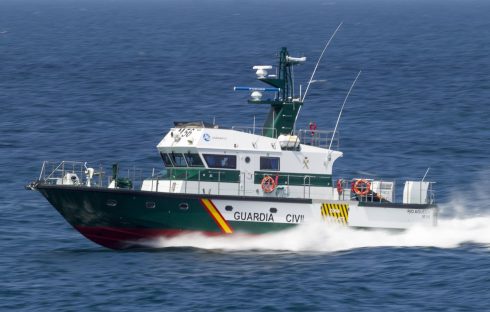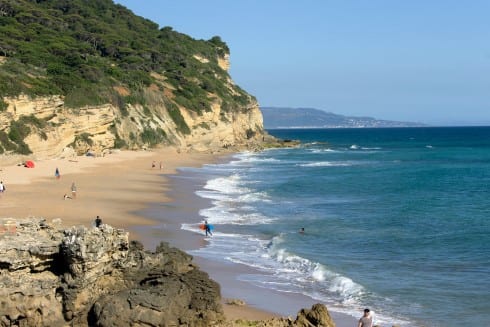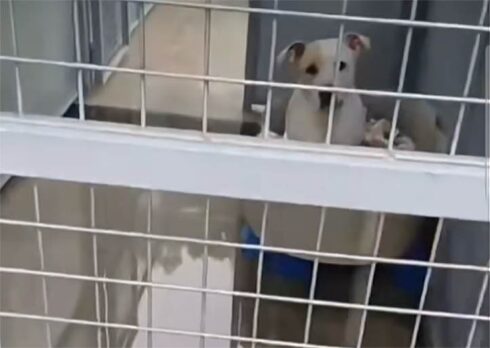A GUARDIA Civil officer who helped narcos steal hash worth €1.5 million from police storage is just the tip of the iceberg.
The Andalucia High Court partially upheld his appeal this week and reduced his stint from an initial eight years to five years and four months.
Defence lawyers for the cop, identified only as MC, argued that, although he guided the narcos into the Sevilla Guardia Civil Command in 2020 and helped them replace the real hash bales with fake lookalikes, he didn’t traffic the drugs himself.
MC would become one of 150 officers who were investigated – if not all convicted – for working with narco traffickers between 2011 and 2020, according to the Interior Ministry. It averages at a dozen a year.

A third of them (52) were caught in Andalucia; 12 in Malaga, eight in Granada, five in Seville, four in Huelva and three in Almería.
But the grand majority of the corrupt cops were arrested in the province of Cadiz, which has long been Spain’s drug trafficking superhighway.
Considering that 2,500 officers are stationed in Cadiz alone, 20 corrupt ones does not even equal one percent.
But the true figure, away from official statistics, could be much higher. And it does not even count the other branches of Spanish law enforcement.
One association of Guardia Civil officers, the AUGC (the Unified Association of the Guardia Civil), recorded 34 arrests between 2018 and 2021 in Andalucia alone.

And a report to Madrid’s National Court sent by Internal Affairs in 2021 acknowledged that ‘there is a serious problem of police corruption in the south of Spain.’
“The serious problem that exists in the Bay of Cadiz with regard to drug trafficking brings with it a whole series of problems inevitably linked to this social scourge [drug trafficking]: corruption, murders, extortion, institutional weakness, insecurity, public health problems, etc…” the report reads, according to El Diario.
“One of the institutions that the large drug trafficking organisations seek to corrupt is, without a doubt, the state security forces.”
There was even talk of ‘Colombisation’ in the Campo de Gibraltar, as the Guardia Civil found themselves insufficiently resourced and some of their members picked off by the lure of narco corruption.
In the last couple of years, the problem has only gone into overdrive.

A trafficker was killed and two agents injured in a collision between a narco launch and a Guardia Civil patrol boat at the mouth of the Guadalquivir river last week.
It prompted the JUCIL, another Guardia Civil association, to claim that law enforcement in the Cadiz region was on ‘the brink of collapse.’
“It is just one more example of the critical situation faced by the Guardia Civil stationed in Cadiz and Campo de Gibraltar,” said spokesperson Agustín Leal.
He said that the collision had taken the Cadiz Command’s last operation patrol boat out of commission at a time when tensions are higher than ever.
“Our colleagues are subjected to brutal stress and a constant risk of violence that is no longer tolerable.
“The Guardia Civil is exhausted by the endless operations against drug trafficking – not only because of the danger they face in each interception, but also because of the lack of resources and support.
“After speaking with many of them, several have confessed that they need to take a few days to decide if they can continue like this, because what is happening in Cadiz is very, very hard, both for them and for their families.”

“Each operation represents an escalation in violence. The Guardia Civil cannot continue to confront armed and dangerous mafias without adequate means,” Leal continued.
The arrest last week of Madrid’s top anti-money laundering cop, Oscar Sanchez – who had €20 million stashed in the walls of his house – goes to show that the problem of police corruption cannot be measured solely in the number of officers arrested.
Sanchez was pinched for providing crucial cover to a narco trafficking operation that tried to smuggle 13 tonnes of cocaine into Spain via the port of Algeciras in a single container.
It underscored how Spain has now overtaken both Holland and Belgium as the key entry point for the drug into Europe.
The Guardia Civil in the province of Cadiz can attest that Spain has long been Europe’s top importer of hash.
It also made it clear that the current record quantities of both cocaine and hash being smuggled into the continent via Spain would not be possible without serious, high-level connivance with those very authorities tasked with stopping it.









“Considering that 2,500 officers are stationed in Cadiz alone, 20 corrupt ones does not even equal one percent.” I presume in the official line from The Olive Press? I’m sorry to read that, which in my book undermines any credibility I ever had for TOP. Zero tolerance is the ONLY standard, and should be enforced.
We keep reading Spain is Europe’s top performing economy. Mr Sanchez: there is a clear message here. Dig deeper and provide the country’s security services with the finances they need to meet fire with fire. And do it now! It’s not a standing – now to be Europe’s top importer of drugs – to be proud of.
Not in the slightest bit is that our official line.
We point out it’s nearly 1% arrested and probably a lot more, particularly when you include other units.
To make that clear: Not even one corrupt officer is acceptable.